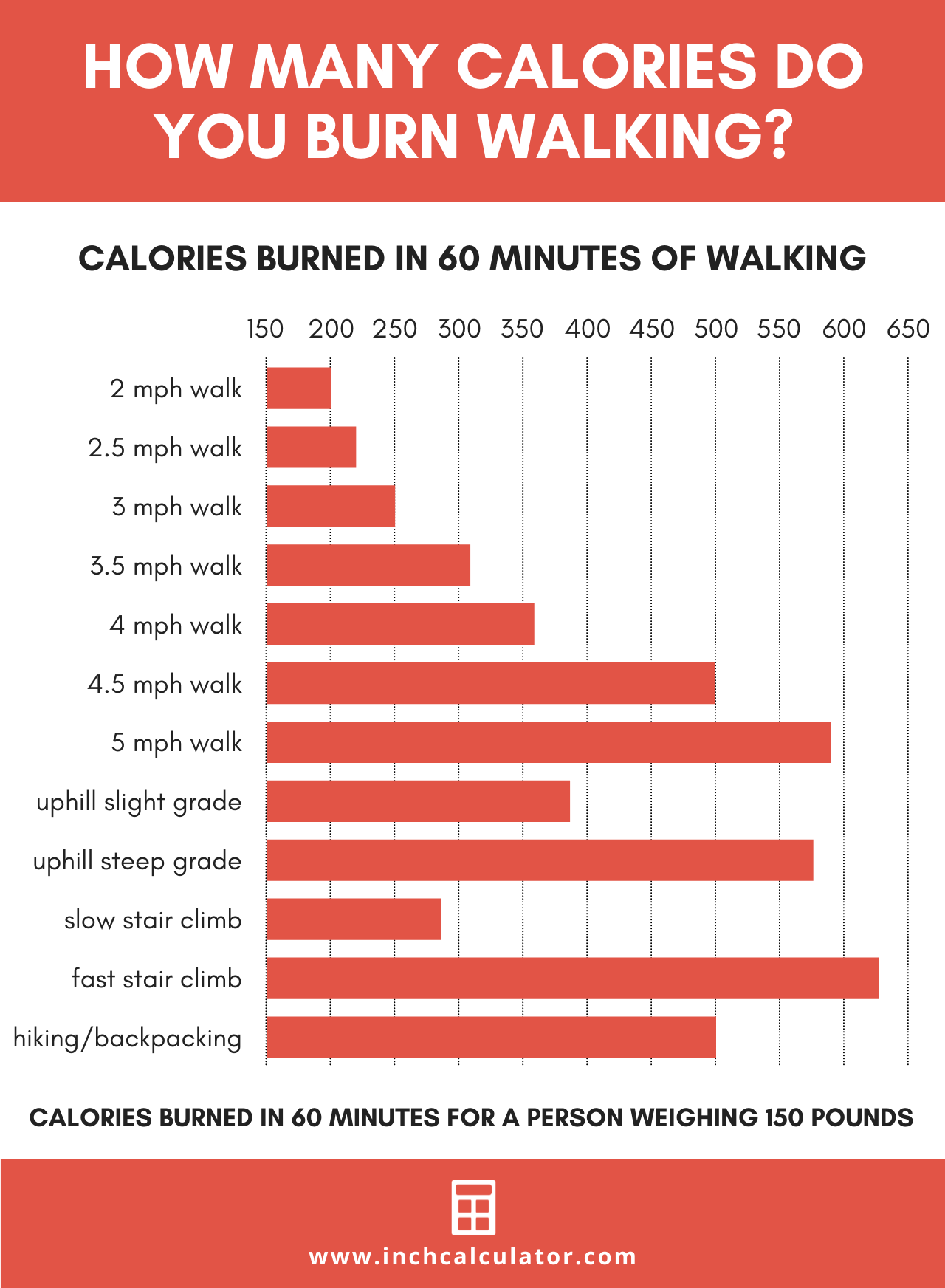Calories Burned Walking Calculator
Calculate the calories you burn walking given your body weight, pace, and duration.
Calories Burned Walking:
Total Calories
Calories per Hour
On this page:
How Many Calories Do You Burn Walking?
Determining how many calories your body needs on any given day depends on the activities you perform. Everything from just walking around your office to formal workouts at the gym count towards your total daily energy expenditure.

To determine how many calories you expend each day, you can calculate the calories burned for each activity you do and then add together these totals. This will give you an estimate of the energy expended during your daily activities.
You can then add this to your basal metabolic rate to determine how many calories you should consume each day to match your energy output.
Start by Finding the MET Value
To calculate calories burned during an activity, you first need to determine the MET value of that activity. A MET, or metabolic equivalent of a task, is the energy expended during an activity, which is expressed as a standardized number.
This number is the metabolic rate during exercise in the given activity compared to the metabolic rate at rest. Scientifically speaking, the metabolic equivalent is defined as the amount of oxygen consumed while sitting at rest. This is equal to 3.5 milliliters of oxygen per kilogram of body weight per minute.[1]
You can estimate how many calories are burned during physical activities and exercises using the corresponding MET values. A complete list can be found in the Compendium of Physical Activities.[2]
Calories Burned Formula
Once you determine the MET value of an activity, you can then plug this into an equation that includes the amount of time spent doing the activity and your current weight. This can then be used in the following formula to calculate the calories burned during that activity.
calories burned = time [min] × (MET × 3.5) × weight [kg] / 200
If you have only tracked the number of steps you’ve been walking, then you can use our steps to calories calculator to estimate the number of calories burned.
MET Values for Walking and Hiking
Walking is a great activity that can burn significant calories, depending on how much time you spend moving and how vigorously you walk. When your muscles move during walking, they require oxygen to produce energy.
Strenuous activities that require more energy will burn more calories. For example, hiking or climbing stairs will burn more calories than walking at a slow pace. Therefore, these activities will have higher MET values.
| Walking Pace | MET Value |
|---|---|
| Slow (1-2 mph) | 2.0 – 3.0 |
| Moderate (2-3 mph) | 2.0 – 5.0 |
| Brisk (3-5 mph) | 5.3 – 8.3 |
| Hiking | 5.3 – 7.8 |
| Climbing Hills | 6.3 – 9.0 |
| Stair Climbing | 4.0 – 8.8 |
| Treadmill Desk, Active Workstation (general) | 2.3 |
As you can see from the table, within each category, there is a range of MET values. If you refer to the compendium, this is due to the fact that you can increase your calorie expenditure by increasing the intensity of each walking activity.
Curious to know how far you’ve walked? Try our steps to miles calculator to find out!
For example, climbing hills with no load has a MET value of 6.3. However, climbing hills with a 42+ pound load has a MET value of 9.0.
So if a 180-pound man spent 30 minutes climbing hills with no load, he would burn about 270 calories.
calories burned = time [min] × (MET × 3.5) × weight [kg] / 200
30 × (6.3 × 3.5) × 180 ÷ 2.2 / 200 = 270 calories
On the other hand, if he spent 30 minutes climbing hills with a heavy load over 42 pounds, he would burn 386 calories.
30 × (9.0 × 3.5) × 180 ÷ 2.2 / 200 = 386 calories
Benefits of Burning Calories with Walking
Walking is a great low impact exercise that will burn calories and has numerous health benefits.
Improved Cardiovascular Health: Studies have shown that walking programs for adults can help decrease the risk of cardiovascular disease.[3] Low- and moderate-intensity walking is associated with several other cardiovascular health benefits as well, including improving cholesterol markers and helping to control high blood pressure.
Decreased Stress and Anxiety: In addition to heart health benefits, walking programs have also been found to decrease stress and anxiety. Walking can boost feelings of well-being. Studies have shown that walking programs can even be used alongside regular physical guided treatment to help reduce symptoms in people previously diagnosed with generalized anxiety disorders, panic disorders, and social phobias.[4]
Improved Bone Health: Walking is not only a great way to boost your heart health and psychological well-being; since it is a low-impact activity, it also improves your bone health and decreases fracture risk in older adults.[5]
Walking is great for people at any fitness level. Even if you are new to a fitness routine, walking can be a great way to burn calories, lose weight, and improve your overall health.
This calculator is a valuable tool in determining how many calories you can burn with a regular walking program at various intensities. Our running calories calculator can help you calculate caloric burn for your runs as well.
References
- Jetté, M., Sidney, K., & Blümchen, G., Metabolic equivalents (METS) in exercise testing, exercise prescription, and evaluation of functional capacity, Clinical cardiology, 1990, 13(8), 555–565. https://doi.org/10.1002/clc.4960130809
- Ainsworth BE, Haskell WL, Herrmann SD, Meckes N, Bassett Jr DR, Tudor-Locke C, Greer JL, Vezina J, Whitt-Glover MC, Leon AS., The Compendium of Physical Activities Tracking Guide, Healthy Lifestyles Research Center, College of Nursing & Health Innovation, Arizona State University, https://pacompendium.com/
- Murtagh, E. M., Murphy, M. H., & Boone-Heinonen, J., Walking: the first steps in cardiovascular disease prevention, Current opinion in cardiology, 2010, 25(5), 490–496. https://doi.org/10.1097/HCO.0b013e32833ce972
- Merom, D., Phongsavan, P., Wagner, R., Chey, T., Marnane, C., Steel, Z., Silove, D., & Bauman, A., Promoting walking as an adjunct intervention to group cognitive behavioral therapy for anxiety disorders—a pilot group randomized trial, Journal of anxiety disorders, 2008, 22(6), 959-968. https://www.sciencedirect.com/science/article/abs/pii/S0887618507001806
- Harris T, Limb ES, Hosking F, Carey I, DeWilde S, et al., Effect of pedometer-based walking interventions on long-term health outcomes: Prospective 4-year follow-up of two randomised controlled trials using routine primary care data, PLOS Medicine, 2019, 16(6), e1002836. https://doi.org/10.1371/journal.pmed.1002836


